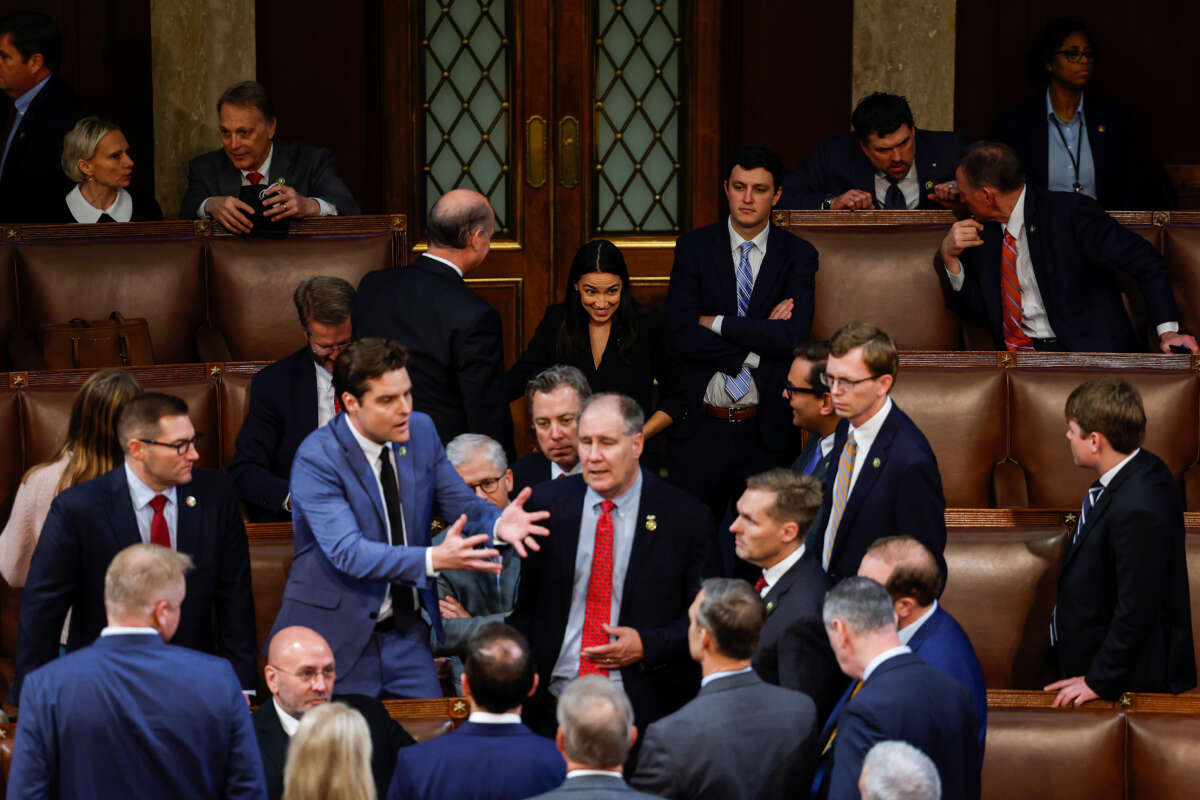As the Republican Party descends into chaos this week, failing six times to elect a new speaker of the House, Rep. Alexandria Ocasio-Cortez (D-New York) has suggested that Republican leader Rep. Kevin McCarthy (California) approach the Democrats with concessions if he wants to win the speakership.
In an interview on MSNBC this week, Ocasio-Cortez emphasized the importance of Democratic unity through the votes held in the House over the past two days, saying that it may be up to McCarthy to decide if he wants to approach the Democratic Caucus to become House speaker.
“In chaos, anything is possible,” Ocasio-Cortez said. “If they want to play ball, we’re open to that.” She noted that the scenario would be “rather unprecedented” but still possible, since there doesn’t currently appear to be anyone in the Republican caucus that could secure the 218 GOP votes needed to become speaker.
McCarthy has failed to achieve that threshold six times this week, with roughly 20 Republicans, many of them belonging to the far right “Freedom Caucus,” blocking him from becoming speaker in each vote. This is despite the fact that McCarthy has made and continues to make major concessions.
Other candidates, including Representatives Andy Biggs (R-Arizona), Jim Jordan (R-Ohio) and Byron Donalds (R-Florida), have not gotten even 10 percent of the votes needed to reach the 218 vote threshold. Meanwhile, in each vote so far, Democrats have all voted for Rep. Hakeem Jeffries (D-New York), who has succeeded Rep. Nancy Pelosi (D-California) as the new leader of the Democratic caucus.
Ocasio-Cortez said that there is a concern that someone more far right than McCarthy — who is already extremist in many ways — could emerge and gain a consensus, which would create a dangerous scenario in terms of key votes on issues like the debt ceiling or even the 2024 election.
But if McCarthy wants to negotiate with Democrats and offer concessions in some form of a coalition government, it could be a win-win scenario in which McCarthy gets the votes to become the speaker and Democrats could gain control they wouldn’t otherwise have under the Republican-controlled House.
“Whether McCarthy pulls this through or not, the core concern here is, who would ascend to that seat? I do not believe that Kevin McCarthy has the votes,” Ocasio-Cortez said. “If McCarthy really wants this, he really needs to look at how he can get to the 218 that he needs. You’ve got to find that math somewhere if you can’t get those votes from the House Freedom Caucus — he has provided many, many, many concessions, and it’s just not working out.”
Other Democrats have also said they are open to negotiating with Republicans to reach an agreement to fill the speaker position, whether or not the speaker is McCarthy; Rep. Ro Khanna (D-California) has suggested that a more moderate Republican, one who didn’t object to the 2020 presidential results, could be nominated.
As for the Democratic Party, Ocasio-Cortez added that it is crucial for the party to act as a block in order to take advantage of the current chaos within the GOP.
“The acknowledgement of how fragile our democracy is in this moment is a critical part to [Democratic] unity,” she said. “We absolutely have differences, but I think a willingness to put that aside in order to figure out how we can navigate and exploit some major moments to advance, really, the issues of working people, raise wages, protect health care, and really defend a lot of the gains that we have made in the last two years is really going to be critical.”
Join us in defending the truth before it’s too late
The future of independent journalism is uncertain, and the consequences of losing it are too grave to ignore. To ensure Truthout remains safe, strong, and free, we need to raise $24,000 by the end of today. Every dollar raised goes directly toward the costs of producing news you can trust.
Please give what you can — because by supporting us with a tax-deductible donation, you’re not just preserving a source of news, you’re helping to safeguard what’s left of our democracy.
